Events
4th Open Seminar in AY 2015
"Diversity and Agronomic Features of Indigenous Upland Rice in Southeast Sulawesi, Indonesia"
"Rice Cultivation in Bangladesh: Present Scenario, Problems, and Prospects"
Uploaded Date: 2018-07-12
Program
| Date | 22 March, 2016 (Tuesday) 15:00 - 17:00 |
|---|---|
| Venue | Lecture Room No.7, School of Agricultural Sciences, Nagoya University |
| Language | English |
* 1st Presentation (15:00 - 16:00) *
Diversity and Agronomic Features of Indigenous Upland Rice in Southeast Sulawesi, Indonesia
Speaker :
Assoc. Prof. Dr. Ir. Yulius B. Pasolon
(Head of Global Partnership and International Office, Halu Oleo University (Indonesia))
Native farmers of the Tolakinese in Southeast Sulawesi have been cultivating upland rice by slash-and-burn farming during the rainy season for personal consumption because of its good flavor, especially aroma, despite the low productivity. The growth and yield of upland rice differs according to these different topographic conditions. Comparison of growth and yield of various upland rice cultivars at flat and sloping conditions will be discussed..
* 2nd Presentation (16:00 - 17:00) *
Rice Cultivation in Bangladesh: Present Scenario, Problems, and Prospects
Speaker :
Assoc. Prof. Dr. Shelley Israt Jahan
(Associate Professor, Department of Crop Botany, Bangladesh Agricultural University (Bangladesh)/ ICCAE Visiting Associate Professor)
Bangladesh has an agrarian economy in which rice is the dominant crop. Over its long history, rice production in Bangladesh has gradually changed in terms of yield potentials, cultivation techniques, and cropping patterns. Despite pressure from overpopulation, the country has reached self-sufficiency in rice production. Although total rice production has increased, yield is low due to drought, salinity, flood, extreme temperature, cyclonic attack etc. In the upcoming session I shall try to explain how we could mitigate the temperature stresses in boro, dry-season irrigated rice. In addition, I shall try to introduce a climate resilient cropping pattern for the vulnerable coastal region of Bangladesh to evade the devastating effects of tropical cyclones and tidal surges.



